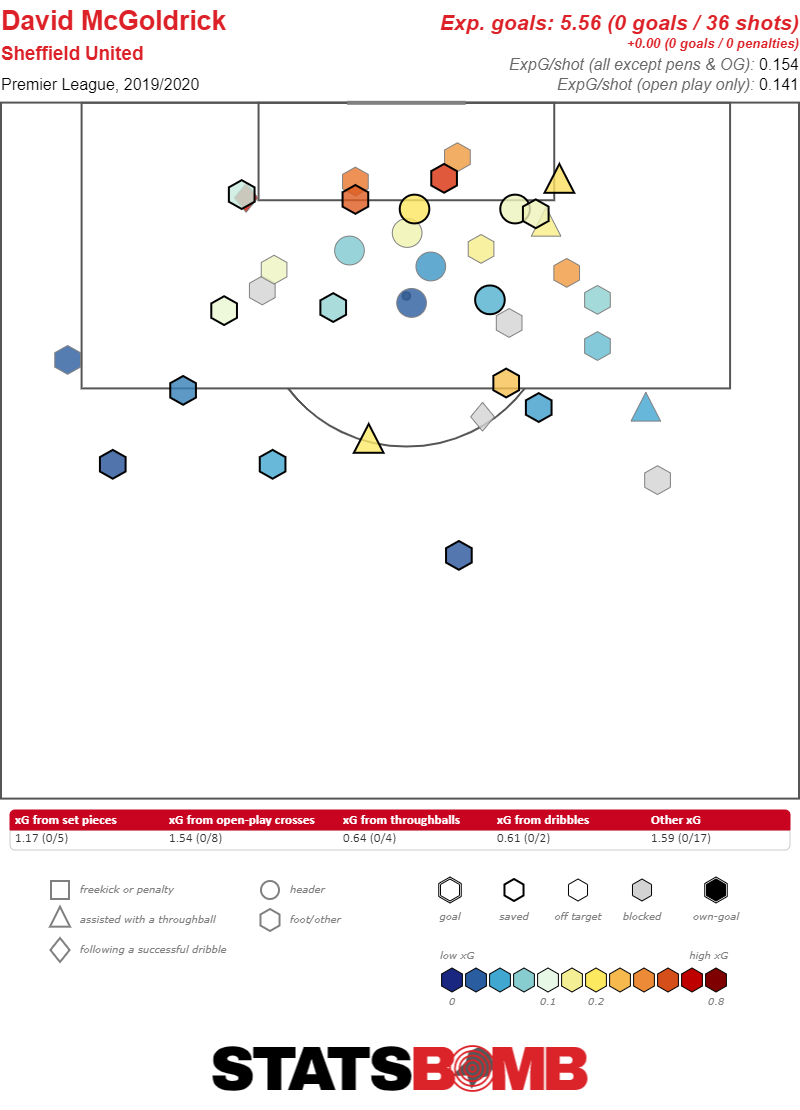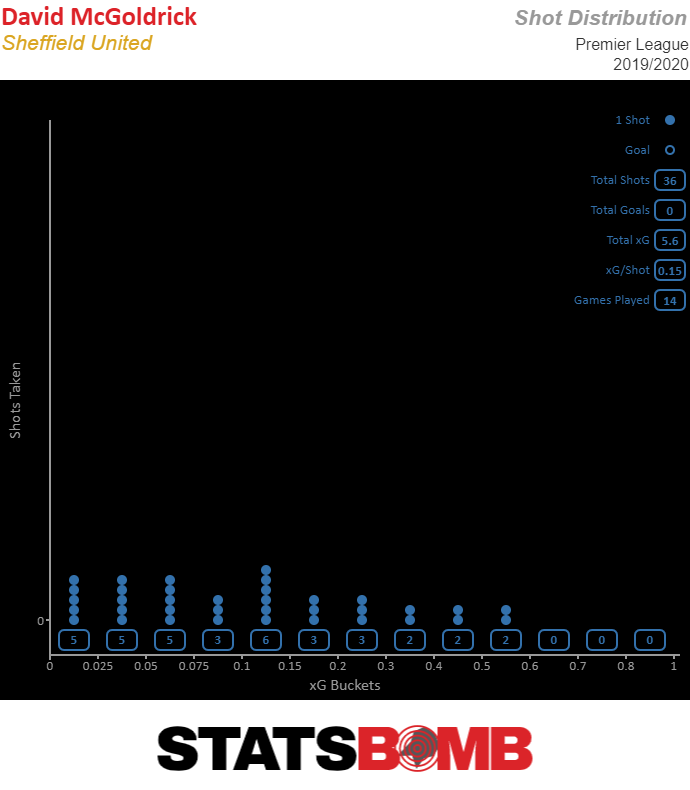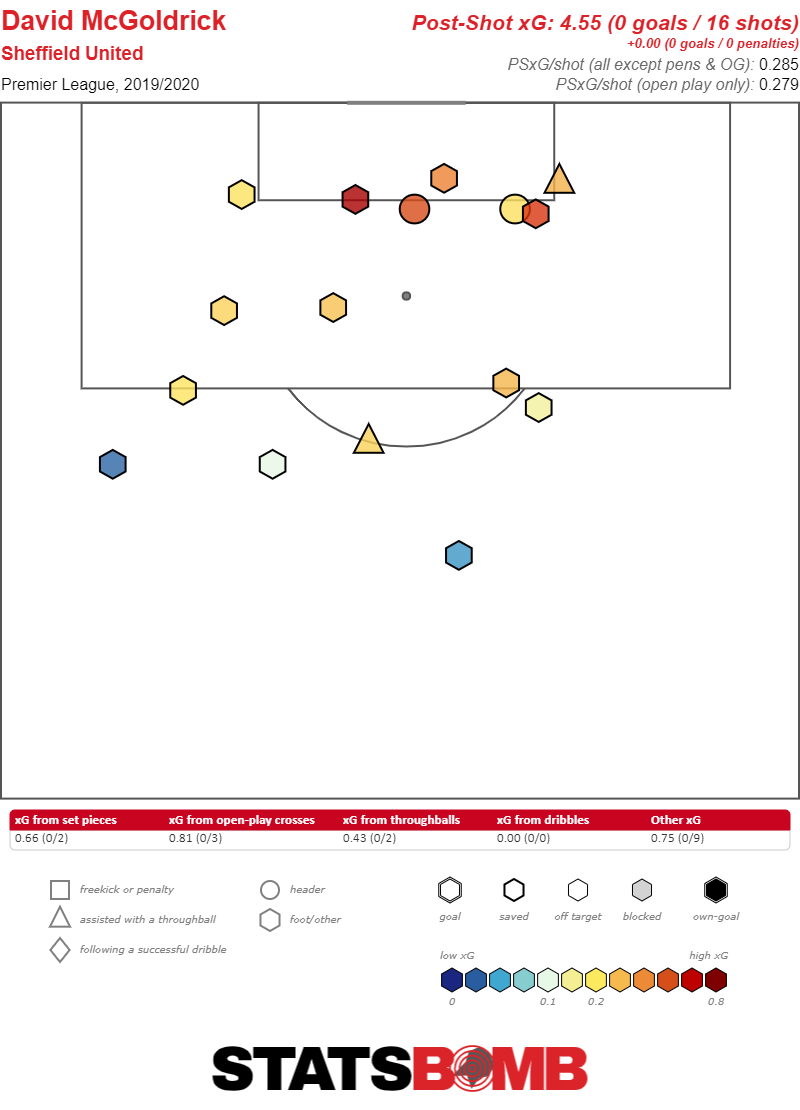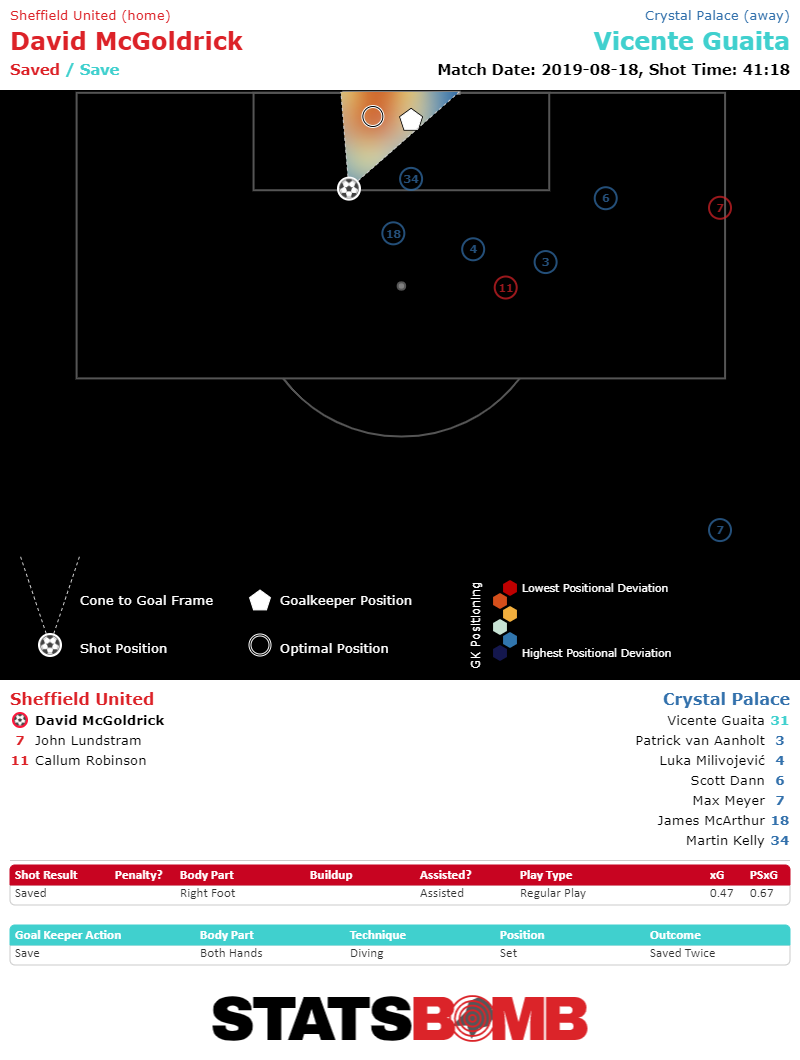One of the most useful things an analyst can do with a statistic like expected goals is find good attacking players who aren’t yet showing up on the score sheet. Players that either take high-quality shots themselves, or create them for their teammates, see those opportunities turn into goals eventually. Then there’s poor David McGoldrick of Sheffield United. Nobody is further behind their expected goal contribution per 90 minutes, defined as combined expected goals and expected goals assisted, than McGoldrick (among players who have played more than 600 minutes). McGoldrick’s futility is even more impressive when you take into account that he has actually assisted more goals than xG predicts. The struggling striker has two assists while he has assisted shots worth 1.26 xG. So, the entirety of McGoldrick’s league-leading struggles at scoring come from shooting. It’s ugly. Couldn’t hit the broad side of a barn with a beachball ugly.  Sometimes, when a player is on a cold streak, it’s clear that the culprit is bad luck. Players that take a lot of long-range shots, for example, will often see dramatic swings in their performance against xG, pinging all around their expected level thanks to the nature of the shots they’re taking. A player who feasts on low percentage shots will occasionally see one go in, which boosts his performance against xG dramatically while also going long stretches missing all the hopeful punts he sends in the general direction of opposing keepers. That’s not happening here though. McGoldrick is actually quite savvy when it comes to shot selection. He averages 0.15 xG per shot, which is a fairly robust number. Among players who have taken more than 20 shots this season, he’s 17th in xG per shot. It’s clear from his shot distribution that he’s not piling on low expectation efforts from distance, he’s just getting lots of pretty good shots and missing every. single. one.
Sometimes, when a player is on a cold streak, it’s clear that the culprit is bad luck. Players that take a lot of long-range shots, for example, will often see dramatic swings in their performance against xG, pinging all around their expected level thanks to the nature of the shots they’re taking. A player who feasts on low percentage shots will occasionally see one go in, which boosts his performance against xG dramatically while also going long stretches missing all the hopeful punts he sends in the general direction of opposing keepers. That’s not happening here though. McGoldrick is actually quite savvy when it comes to shot selection. He averages 0.15 xG per shot, which is a fairly robust number. Among players who have taken more than 20 shots this season, he’s 17th in xG per shot. It’s clear from his shot distribution that he’s not piling on low expectation efforts from distance, he’s just getting lots of pretty good shots and missing every. single. one.  How exactly is McGoldrick managing to pull off this trick? Well, if we pry apart his shooting numbers we see some interesting stuff (still no goals though). How exactly is he missing? One thing that appears to be happening is that goalkeepers are playing absolutely out of their minds against him. The post-shot xG value of McGoldtrick’s shots is 4.55 from 16 on-target shots.
How exactly is McGoldrick managing to pull off this trick? Well, if we pry apart his shooting numbers we see some interesting stuff (still no goals though). How exactly is he missing? One thing that appears to be happening is that goalkeepers are playing absolutely out of their minds against him. The post-shot xG value of McGoldtrick’s shots is 4.55 from 16 on-target shots.  A brief nerdy stats note here. Post-shot xG doesn’t tell us very much that’s meaningful about the quality of McGoldrick’s shooting. A shot that fizzes just wide gets a value of zero and one that’s lollipopped softly into the keeper's arms will have a non-zero value, while the former may very well be a better attempt than the latter. So, the fact that the post-shot xG here is lower than regular xG doesn’t prove much about McGoldrick’s attempts. What it does show is that keepers seem to turn into gigantic multi-armed monsters against him, saving over four more shots than expected. When we get this granular, of course, there is always going to be some debate about who deserves credit for a great save, and who gets blamed for perhaps making the keeper's life easier than the numbers can detect. Those issues get averaged out with large numbers of shots, but when we’re looking at something like McGoldrick prodding a ball in the general direction of a gaping net, and Crystal Palace’s Vincente Guaita recovering to make a save, the question of sorting out exactly who gets credits and demerits for what remains an open one.
A brief nerdy stats note here. Post-shot xG doesn’t tell us very much that’s meaningful about the quality of McGoldrick’s shooting. A shot that fizzes just wide gets a value of zero and one that’s lollipopped softly into the keeper's arms will have a non-zero value, while the former may very well be a better attempt than the latter. So, the fact that the post-shot xG here is lower than regular xG doesn’t prove much about McGoldrick’s attempts. What it does show is that keepers seem to turn into gigantic multi-armed monsters against him, saving over four more shots than expected. When we get this granular, of course, there is always going to be some debate about who deserves credit for a great save, and who gets blamed for perhaps making the keeper's life easier than the numbers can detect. Those issues get averaged out with large numbers of shots, but when we’re looking at something like McGoldrick prodding a ball in the general direction of a gaping net, and Crystal Palace’s Vincente Guaita recovering to make a save, the question of sorting out exactly who gets credits and demerits for what remains an open one.  Individual shots get missed all the time, for all sorts of reasons. It’s just that McGoldrick has missed so darn many of them this season. Four separate times he’s managed to kick the ball towards goal from inside the six-yard box, only to see two of them get saved, and two of them miss the target entirely. The good news for McGoldrick is that he’s almost certainly getting unlucky. Whenever something this unlikely happens, it’s at least partially down to dumb luck. The problem for him is that it’s also probably not just luck. McGoldrick is 32 years old. He’s played his entire career in the lower divisions of English football and never been a consistent goal scorer. While he scored 12 non-penalty goals last season from 15.20 xG (and an additional three penalties), he has not had a prolific goal-scoring career. Before last season he had only reached double digits in goals three times, in 2013–14 with 14 goals for Ipswich Town in the Championship, 2012–13 with 16 goals for Coventry City in League One, and way back in 2008–09 with Southampton in the Championship. All things being equal, we expect players to eventually perform to the xG. But, sometimes everything else is not equal. McGoldrick is a longtime journeyman of a striker. Suddenly at age 32, he finds himself playing at the highest level of his career. He plays for an extraordinarily well-coached team in Sheffield United, one that is exceptional at working together to create great shots. McGoldrick keeps missing those great shots. The simplest explanation is not that McGoldrick is facing exceptionally, historically bad luck (although we shouldn’t rule that possibility out entirely) but rather that he’s a player who just isn’t quite good enough for this level. Sheffield United manager Chris Wilder excels at getting the most out of his squad. That includes finding an aging striker with a preternatural instinct for getting on the end of his team’s highly choreographed creative attacking moves to create really good chances. When you’re Wilder and Sheffield United, however, you’re also shopping in the bargain bin, and that means perhaps the player you’ve found to do that just isn’t quite up to snuff when it comes to actually putting the ball into the back of the net. So, the bad news is that McGoldrick’s finishing struggles might not just be bad luck. The good news is that Sheffield United are succeeding this season anyway. The really good news is that this means there’s room for them to become even better. Just imagine what this team might do if one of their strikers wasn’t chronically unable to finish.
Individual shots get missed all the time, for all sorts of reasons. It’s just that McGoldrick has missed so darn many of them this season. Four separate times he’s managed to kick the ball towards goal from inside the six-yard box, only to see two of them get saved, and two of them miss the target entirely. The good news for McGoldrick is that he’s almost certainly getting unlucky. Whenever something this unlikely happens, it’s at least partially down to dumb luck. The problem for him is that it’s also probably not just luck. McGoldrick is 32 years old. He’s played his entire career in the lower divisions of English football and never been a consistent goal scorer. While he scored 12 non-penalty goals last season from 15.20 xG (and an additional three penalties), he has not had a prolific goal-scoring career. Before last season he had only reached double digits in goals three times, in 2013–14 with 14 goals for Ipswich Town in the Championship, 2012–13 with 16 goals for Coventry City in League One, and way back in 2008–09 with Southampton in the Championship. All things being equal, we expect players to eventually perform to the xG. But, sometimes everything else is not equal. McGoldrick is a longtime journeyman of a striker. Suddenly at age 32, he finds himself playing at the highest level of his career. He plays for an extraordinarily well-coached team in Sheffield United, one that is exceptional at working together to create great shots. McGoldrick keeps missing those great shots. The simplest explanation is not that McGoldrick is facing exceptionally, historically bad luck (although we shouldn’t rule that possibility out entirely) but rather that he’s a player who just isn’t quite good enough for this level. Sheffield United manager Chris Wilder excels at getting the most out of his squad. That includes finding an aging striker with a preternatural instinct for getting on the end of his team’s highly choreographed creative attacking moves to create really good chances. When you’re Wilder and Sheffield United, however, you’re also shopping in the bargain bin, and that means perhaps the player you’ve found to do that just isn’t quite up to snuff when it comes to actually putting the ball into the back of the net. So, the bad news is that McGoldrick’s finishing struggles might not just be bad luck. The good news is that Sheffield United are succeeding this season anyway. The really good news is that this means there’s room for them to become even better. Just imagine what this team might do if one of their strikers wasn’t chronically unable to finish.
2020
The shooting woes of Sheffield United's David McGoldrick, a StatsBomb investigation
By Kevin Lawson
|
February 11, 2020